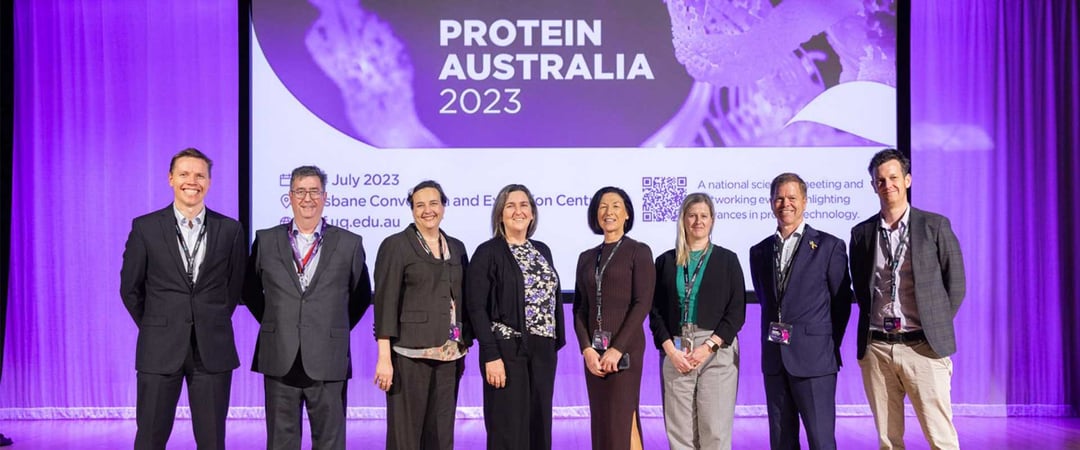From studying to working in life sciences
life sciences

Making the leap from student life to working life can be intimidating and a far departure from what you’re used to. However, with the current boom of the life science industry and the available careers, there is great potential to be at the forefront of technological advancement. So, how can you maximise your chances of scoring a great position? Brunel Australasia’s Life Sciences Business Manager, Deirdre Perkins was a recent panelist for Protein Australia 2023, speaking to students in the audience who have completed or are close to completing their PhDs about successfully transitioning from academia to industry.
Protein Australia 2023, an annual science and networking event hosted by UQ PEF, was recently held in Brisbane, Queensland. The event highlighted advances in protein technology, a hot topic within the life science community due to the role of protein in vaccine production. Academic, government and industry representatives were in attendance, discussing protein research, advanced biomanufacturing and novel technologies.

Deirdre joined a distinguished panel of experts from the University of Queensland, CSIRO, Thermo Fisher Scientific and the QLD Department of Environment and Science.
A common mistake made by academics on the job hunt is failing to address criteria in job posts. Students tend to present talent acquisition professionals with their full academic histories, complete with every paper they’ve been published in. While impressive, talent acquisition professionals aren’t necessarily academics themselves, and look for candidates who simply address the criteria. Failing to do so demonstrates a lack of understanding of what the company you’re applying to is actually looking for, which is why Deirdre recommends proving your interest by conducting research beforehand and addressing criteria in your resumes and applications, and omitting unnecessary information.
Deirdre also explained that part of making the transition to industry is understanding that you can’t isolate yourself during your PhD program and solely focus on research. You should also network and look for committees and professional organisations to join, and brush up on the current state of the industry. Academics can be somewhat incognisant when it comes to applying for and securing roles. They’re used to studying and researching and don’t have much corporate or industry experience.

Deirdre also gave the students some general tips for succeeding in interviews. As she puts it,
Just because they’re PhD students doesn't mean they immediately understand how to best conduct themselves in a job interview, and many of them appreciate some guidance. I reminded them to dress appropriately in corporate attire, conduct themselves professionally and cordially, and show their interest in a company by asking questions about it and showing they’ve looked into it before the interview. Academics are excellent researchers after all, and they should make the most of their research abilities.
Quote 1
With her vast experience in life science talent acquisition, Deirdre has seen every sort of candidate, and knows what works and what doesn’t when chasing a position. Today, social media is playing an ever more important role in talent acquisition, and it’s no different for academics looking for a role. As Deirdre puts it,
You need to pay attention to LinkedIn if you’re transitioning from the academic world to the corporate world. It can be surprising how important it is, not just for finding job opportunities but for scoping out the current landscape of the industry and positioning yourself within it. On LinkedIn you can see who’s who, and how you stack up against other candidates and professionals who have more experience in the role you want.
Quote 2
Again, Deirdre gave some general tips to the students, this time on how to present yourself online and specifically on LinkedIn. This included updating your profile picture, and skills and qualifications sections, and reaching out to people within the industry to make useful connections.

While they may be obvious to some, these tips can be easily overlooked if you have limited experience, and it’s always good to be reminded. Overall, the students weren’t just given tips but also encouragement from Deirdre, which can go a long way for students who may be apprehensive about their futures. With some encouragement and guidance, students have a better chance of moving forward confidently and successfully on their career paths.
A scientist-by-training, Deirdre spent the early part of her career working in the global pharmaceutical industry in Ireland and Australia before transitioning into Life Sciences recruitment. She has successfully delivered talent solutions for laboratory, regulatory, clinical, business development, environmental and research divisions for over 30 years.